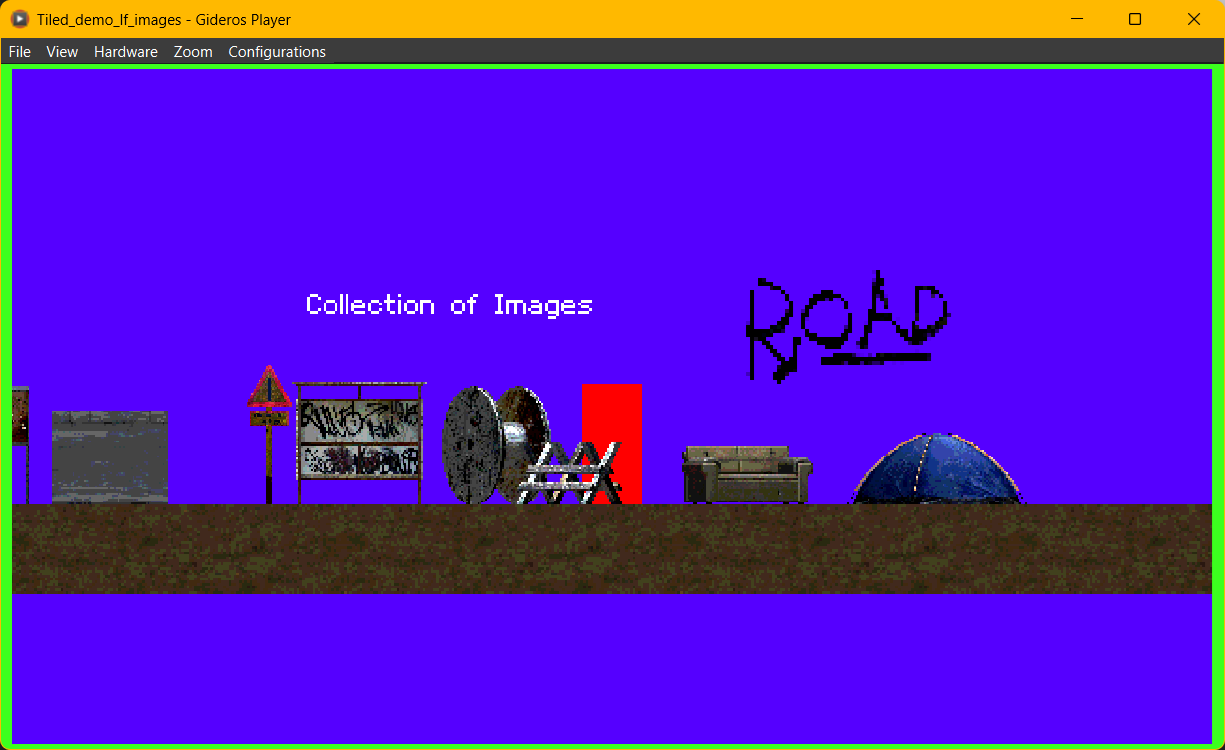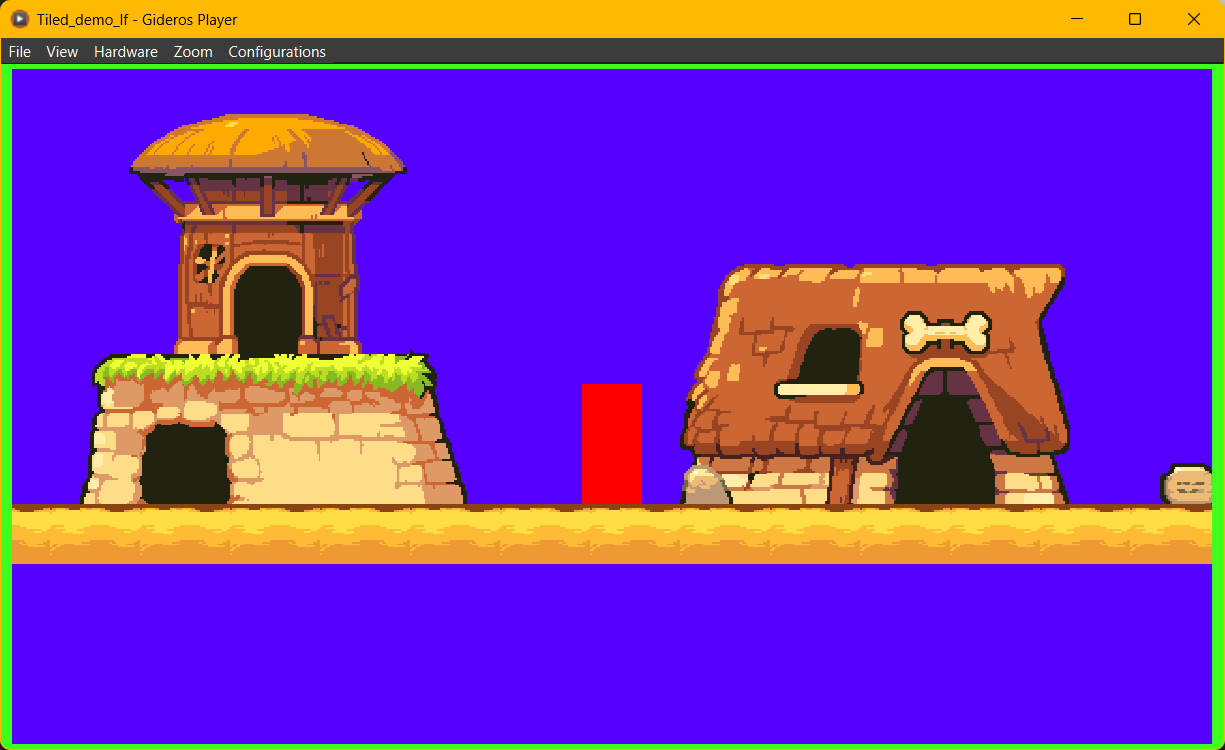Tiled Basics
Description
Here we will set up Gideros to work with Tiled.
Tiled lets you use various layers: Tile Layer, Object Layer, Image Layer, Group Layer.
 level1 using Collection of Images
level1 using Collection of Images
full demo available at the end!
LOAD YOUR TILED MAP
This is how you could load your Tiled maps in Gideros:
TiledLevels.new(pathtotiledlevel, layers)
An excerpt from the demo project where we call the TiledLevels Class:
LevelX = Core.class(Sprite)
function LevelX:init()
application:setBackgroundColor(0x55aaff)
-- _ __ ________ _____ _____
--| | /\\ \ / / ____| __ \ / ____|
--| | / \\ \_/ /| |__ | |__) | (___
--| | / /\ \\ / | __| | _ / \___ \
--| |____ / ____ \| | | |____| | \ \ ____) |
--|______/_/ \_\_| |______|_| \_\_____/
local layers = {}
layers["main"] = Sprite.new() -- one Sprite to hold them all
layers["bg"] = Sprite.new() -- bg layer
layers["actors"] = Sprite.new() -- actors layer
layers["fg"] = Sprite.new() -- fg layer
-- _ ________ ________ _ _____
--| | | ____\ \ / / ____| | / ____|
--| | | |__ \ \ / /| |__ | | | (___
--| | | __| \ \/ / | __| | | \___ \
--| |____| |____ \ / | |____| |____ ____) |
--|______|______| \/ |______|______|_____/
self.tiledlevels = {}
self.tiledlevels[1] = "tiled/levels/level01" -- lua file without extension
self.tiledlevels[2] = "tiled/levels/level02" -- lua file without extension
-- ...
-- here we build the level using Tiled
TiledLevels.new(self.tiledlevels[g_currlevel], layers)
-- ...
g_currlevel is a global variable declared in the "main.lua" file. The demo project has currently 2 Tiled levels available:
- g_currlevel = 1, level built using Tiled: New Tileset -> Collection of Images
- g_currlevel = 2, level built using Tiled: New Tileset -> Based on Tileset Image
main.lua:
-- ...
-- global vars
g_currlevel = 1 -- 1 = Collection of Images, 2 = Tileset
-- ...
Below is the TiledLevels Class.
BUILD YOUR LEVEL
The TiledLevels Class will read a Tiled lua file and build the level in Gideros.
There are a couple of steps before building the level:
- we need to link the Tiled Tileset images to their correct tile id
- optionally it is best (performance wise) to pack the images
- we create a parseImage function for each Tiled layers to call
We can then read each Tiled Layers and build our levels that is, displaying images and shapes on the screen.
note: the layers names in the code correspond to the layers names in Tiled
For drawing the shapes (Ellipse, Point, Polygon, Polyline, Rectangle, Text) we will call the buildShapes function.
You will find below the steps implemented in the TiledLevels Class.
BUILD YOUR LEVEL FULL CODE
TiledLevels = Core.class(Sprite)
function TiledLevels:init(tmpath, xlayers)
local myformat = TextureBase.RGBA4444 -- perfs? XXX
local tm = require(tmpath) -- eg.: "tiled/test" without ".lua" extension + exclude from execution!
local tsimgpath -- "tiled/", Tiled root path to images
if g_currlevel == 1 then tsimgpath = "tiled/levels/" -- level01
elseif g_currlevel == 2 then tsimgpath = "tiled/levels/" -- level02
-- ...
end
-- _______ _____ _ ______ _____ ______ _______
--|__ __|_ _| | | ____|/ ____| ____|__ __|
-- | | | | | | | |__ | (___ | |__ | |
-- | | | | | | | __| \___ \| __| | |
-- | | _| |_| |____| |____ ____) | |____ | |
-- |_| |_____|______|______|_____/|______| |_|
-- this is the classic "Tileset"
for i = 1, #tm.tilesets do
local tileset = tm.tilesets[i]
-- add extra values (variables) to a tm.tilesets[i] table
if tileset.image then -- only tileset tilemap layers
tileset.numcols = math.floor(
(tileset.imagewidth-tileset.margin+tileset.spacing)/
(tileset.tilewidth+tileset.spacing)
)
tileset.numrows = math.floor(
(tileset.imageheight-tileset.margin+tileset.spacing)/
(tileset.tileheight+tileset.spacing)
)
tileset.lastgid = tileset.firstgid+(tileset.numcols*tileset.numrows)-1
tileset.texture = Texture.new(tsimgpath..tileset.image, false,
{ format=myformat, extend=false, } -- extend=false, true
)
end
end
-- classic tileset function
local function gid2tileset(tm, gid)
for i = 1, #tm.tilesets do
local tileset = tm.tilesets[i]
if tileset.image then -- only valid tileset layers
if tileset.firstgid <= gid and gid <= tileset.lastgid then
return tileset
end
end
end
end
-- _______ _____ _ ______ _____ ______ _______
--|__ __|_ _| | | ____|/ ____| ____|__ __|
-- | | | | | | | |__ | (___ | |__ | |
-- | | | | | | | __| \___ \| __| | |
-- | | _| |_| |____| |____ ____) | |____ | |
-- |_| |_____|______|______|_____/|______| |_|
-- _____ __ __ _____ ______ _____
--|_ _| \/ | /\ / ____| ____|/ ____|
-- | | | \ / | / \ | | __| |__ | (___
-- | | | |\/| | / /\ \| | |_ | __| \___ \
-- _| |_| | | |/ ____ \ |__| | |____ ____) |
--|_____|_| |_/_/ \_\_____|______|_____/
-- this one is for "Collection of Images"
local tilesetimages = {} -- table holding all the tileset images info (path, width, height)
for i = 1, #tm.tilesets do
local tileset = tm.tilesets[i]
if not tileset.image then -- filter out tileset tilemap layers, only tileset images
local tiles = tileset.tiles
for j = 1, #tiles do
-- populate the tilesetimages table based on the tile gid and id
-- note: you may have to adjust the path (tsimgpath) to point to the image folder
tilesetimages[tileset.firstgid + tiles[j].id] = {
path=tsimgpath..tiles[j].image,
width=tiles[j].width,
height=tiles[j].height,
}
end
end
end
--[[
-- this function is if you don't want to pack your Tiled images even though you should!
local function parseImage(xobject, xlayer)
local tex = Texture.new(tilesetimages[xobject.gid].path, false,
{ format=myformat , extend=false, } -- extend=false, true
)
local bitmap = Bitmap.new(tex)
bitmap:setAnchorPoint(0, 1) -- because I always forget to modify Tiled objects alignment
-- supports Tiled image scaling
local scalex, scaley = xobject.width/tex:getWidth(), xobject.height/tex:getHeight()
bitmap:setScale(scalex, scaley)
bitmap:setRotation(xobject.rotation)
bitmap:setPosition(xobject.x, xobject.y)
xlayer:addChild(bitmap)
end
]]
-- pack all the images for perfs (TexturePack)
local tpt = {} -- texture pack table
for i = 1, #tm.layers do
local layer = tm.layers[i]
if layer.name:match("bg_deco_images") or layer.name:match("fg_deco_images") then
for i = 1, #layer.objects do
-- print("path", tilesetimages[layer.objects[i].gid].path)
tpt[#tpt+1] = tilesetimages[layer.objects[i].gid].path
end
end
end
local tp = TexturePack.new(tpt, nil, nil, { format=myformat, } )
-- tileset images function
local function parseImage(xobject, xlayer)
local bitmap = Bitmap.new(tp:getTextureRegion(tilesetimages[xobject.gid].path))
bitmap:setAnchorPoint(0, 1) -- because I always forget to modify Tiled objects alignment
-- supports Tiled image scaling
local scalex, scaley = xobject.width/bitmap:getWidth(), xobject.height/bitmap:getHeight()
bitmap:setScale(scalex, scaley)
bitmap:setRotation(xobject.rotation)
bitmap:setPosition(xobject.x, xobject.y)
xlayer:addChild(bitmap)
end
-- ____ _ _ _____ _ _____ _ ________ ________ _
--| _ \| | | |_ _| | | __ \ | | | ____\ \ / / ____| |
--| |_) | | | | | | | | | | | | | | | |__ \ \ / /| |__ | |
--| _ <| | | | | | | | | | | | | | | __| \ \/ / | __| | |
--| |_) | |__| |_| |_| |____| |__| | | |____| |____ \ / | |____| |____
--|____/ \____/|_____|______|_____/ |______|______| \/ |______|______|
-- let's go
for i = 1, #tm.layers do
local layer = tm.layers[i]
local tilemaps = {}
local group -- group = Sprite.new()
-- _______ _____ _ ______ _ __ ________ _____
--|__ __|_ _| | | ____| | /\\ \ / / ____| __ \
-- | | | | | | | |__ | | / \\ \_/ /| |__ | |__) |
-- | | | | | | | __| | | / /\ \\ / | __| | _ /
-- | | _| |_| |____| |____| |____ / ____ \| | | |____| | \ \
-- |_| |_____|______|______|______/_/ \_\_| |______|_| \_\
-- this is the classic: "Tileset" layers
-- background = bg, foreground = fg
if layer.type == "tilelayer" and (layer.name:match("bg") or layer.name:match("fg")) then
if layer.name:match("bg") then group = xlayers["bg"]
else group = xlayers["fg"]
end
for y = 1, layer.height do
for x = 1, layer.width do
local index = x + (y - 1) * layer.width
local gid = layer.data[index]
local gidtileset = gid2tileset(tm, gid)
if gidtileset then
local tilemap
if tilemaps[gidtileset] then
tilemap = tilemaps[gidtileset]
else
tilemap = TileMap.new(
layer.width, layer.height,
gidtileset.texture, gidtileset.tilewidth, gidtileset.tileheight,
gidtileset.spacing, gidtileset.spacing,
gidtileset.margin, gidtileset.margin,
tm.tilewidth, tm.tileheight
)
tilemaps[gidtileset] = tilemap
group:addChild(tilemap)
end
local tx = (gid - gidtileset.firstgid) % gidtileset.numcols + 1
local ty = math.floor((gid - gidtileset.firstgid) / gidtileset.numcols) + 1
tilemap:setTile(x, y, tx, ty)
end
end
end
group:setAlpha(layer.opacity)
-- ____ ____ _ ______ _____ _______ _ __ ________ _____
-- / __ \| _ \ | | ____/ ____|__ __| | /\\ \ / / ____| __ \
--| | | | |_) | | | |__ | | | | | | / \\ \_/ /| |__ | |__) |
--| | | | _ < _ | | __|| | | | | | / /\ \\ / | __| | _ /
--| |__| | |_) | |__| | |___| |____ | | | |____ / ____ \| | | |____| | \ \
-- \____/|____/ \____/|______\_____| |_| |______/_/ \_\_| |______|_| \_\
-- "Collection of Image" are in Object Layers
elseif layer.type == "objectgroup" then
local o
local myshape, mytable
local levelsetup = {}
-- _ _
-- | | | |
-- __| | ___ ___ ___ | | __ _ _ _ ___ _ __ ___
-- / _` |/ _ \/ __/ _ \ | |/ _` | | | |/ _ \ '__/ __|
--| (_| | __/ (_| (_) | | | (_| | |_| | __/ | \__ \
-- \__,_|\___|\___\___/ |_|\__,_|\__, |\___|_| |___/
-- __/ |
-- |___/
if layer.name:match("bg_deco_images") then
for i = 1, #layer.objects do
parseImage(layer.objects[i], xlayers["bg"])
end
elseif layer.name:match("fg_deco_images") then
for i = 1, #layer.objects do
parseImage(layer.objects[i], xlayers["fg"])
end
elseif layer.name:match("bg_deco_shapes") then
for i = 1, #layer.objects do
o = layer.objects[i]
myshape, mytable = nil, nil
local color = math.random(0xffffff)
local tex = "gfx/textures/wdipagu_2K_Albedo.jpg_0007.png"
mytable = {
texpath=tex, istexpot=true, scalex=1,
color=color,
}
levelsetup = {}
for k, v in pairs(mytable) do levelsetup[k] = v end
myshape = self:buildShapes(o, levelsetup)
myshape:setPosition(o.x, o.y)
xlayers["bg"]:addChild(myshape)
end
elseif layer.name:match("fg_deco_shapes") then
for i = 1, #layer.objects do
o = layer.objects[i]
myshape, mytable = nil, nil
local color = math.random(0xffffff)
local tex = "gfx/textures/wdipagu_2K_Albedo.jpg_0007.png"
mytable = {
shapelinewidth=3, shapelinecolor=color,
texpath=tex, istexpot=true, scalex=1,
color=color,
}
levelsetup = {}
for k, v in pairs(mytable) do levelsetup[k] = v end
myshape = self:buildShapes(o, levelsetup)
myshape:setPosition(o.x, o.y)
xlayers["fg"]:addChild(myshape)
end
end
-- some cleaning?
o = nil
myshape, mytable = nil, nil
levelsetup = {}
end
end
end
-- deco shapes
function TiledLevels:buildShapes(xobject, xlevelsetup)
local myshape -- Tiled shapes: ellipse, point, polygon, polyline, rectangle, text
local tablebase = {}
if xobject.shape == "ellipse" then
tablebase = {
x=xobject.x, y=xobject.y,
w=xobject.width, h=xobject.height,
rotation=xobject.rotation,
}
for k, v in pairs(xlevelsetup) do tablebase[k] = v end
myshape = Tiled_Shape_Ellipse.new(tablebase)
elseif xobject.shape == "point" then
tablebase = {
x=xobject.x, y=xobject.y,
rotation=xobject.rotation,
}
for k, v in pairs(xlevelsetup) do tablebase[k] = v end
myshape = Tiled_Shape_Point.new(tablebase)
elseif xobject.shape == "polygon" then
tablebase = {
x=xobject.x, y=xobject.y,
coords=xobject.polygon,
rotation=xobject.rotation,
}
for k, v in pairs(xlevelsetup) do tablebase[k] = v end
myshape = Tiled_Shape_Polygon.new(tablebase)
elseif xobject.shape == "polyline" then -- lines
tablebase = {
x=xobject.x, y=xobject.y,
coords=xobject.polyline,
rotation=xobject.rotation,
}
for k, v in pairs(xlevelsetup) do tablebase[k] = v end
myshape = Tiled_Shape_Polyline.new(tablebase)
elseif xobject.shape == "rectangle" then
tablebase = {
x=xobject.x, y=xobject.y,
w=xobject.width, h=xobject.height,
rotation=xobject.rotation,
}
for k, v in pairs(xlevelsetup) do tablebase[k] = v end
myshape = Tiled_Shape_Rectangle.new(tablebase)
elseif xobject.shape == "text" then
tablebase = {
x=xobject.x, y=xobject.y,
text=xobject.text,
w=xobject.width, h=xobject.height,
rotation=xobject.rotation,
}
for k, v in pairs(xlevelsetup) do tablebase[k] = v end
myshape = Tiled_Shape_Text.new(tablebase)
else
print("*** CANNOT PROCESS THIS SHAPE! ***", xobject.shape, xobject.name)
return
end
return myshape
end
TILED DECO SHAPES
Here are the classes to build the Tiled shapes for decoration: Tiled Deco Shapes
DEMO PROJECT
Media:Tiled demo base.zip (tip: right click -> Save Link As)
